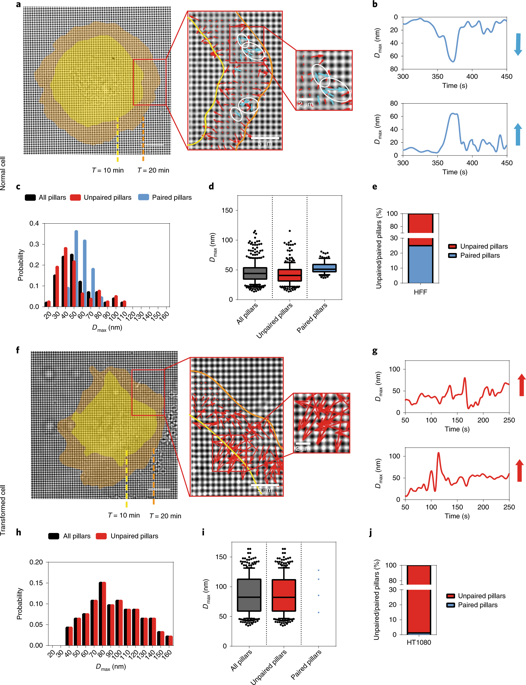当前位置:
X-MOL 学术
›
Nat. Mater.
›
论文详情
Our official English website, www.x-mol.net, welcomes your
feedback! (Note: you will need to create a separate account there.)
Stopping transformed cancer cell growth by rigidity sensing.
Nature Materials ( IF 37.2 ) Pub Date : 2019-10-28 , DOI: 10.1038/s41563-019-0507-0 Bo Yang 1 , Haguy Wolfenson 2 , Vin Yee Chung 3 , Naotaka Nakazawa 1, 4 , Shuaimin Liu 5 , Junqiang Hu 5 , Ruby Yun-Ju Huang 3, 6, 7 , Michael P Sheetz 1, 8, 9
Nature Materials ( IF 37.2 ) Pub Date : 2019-10-28 , DOI: 10.1038/s41563-019-0507-0 Bo Yang 1 , Haguy Wolfenson 2 , Vin Yee Chung 3 , Naotaka Nakazawa 1, 4 , Shuaimin Liu 5 , Junqiang Hu 5 , Ruby Yun-Ju Huang 3, 6, 7 , Michael P Sheetz 1, 8, 9
Affiliation

|
A common feature of cancer cells is the alteration of kinases and biochemical signalling pathways enabling transformed growth on soft matrices, whereas cytoskeletal protein alterations are thought to be a secondary issue. However, we report here that cancer cells from different tissues can be toggled between transformed and rigidity-dependent growth states by the absence or presence of mechanosensory modules, respectively. In various cancer lines from different tissues, cells had over tenfold fewer rigidity-sensing contractions compared with normal cells from the same tissues. Restoring normal levels of cytoskeletal proteins, including tropomyosins, restored rigidity sensing and rigidity-dependent growth. Further depletion of other rigidity sensor proteins, including myosin IIA, restored transformed growth and blocked sensing. In addition, restoration of rigidity sensing to cancer cells inhibited tumour formation and changed expression patterns. Thus, the depletion of rigidity-sensing modules through alterations in cytoskeletal protein levels enables cancer cell growth on soft surfaces, which is an enabling factor for cancer progression.
中文翻译:

通过刚性感应来阻止转化的癌细胞生长。
癌细胞的一个共同特征是激酶和生化信号通路的改变,从而实现软基质上的转化生长,而细胞骨架蛋白的改变被认为是次要问题。然而,我们在这里报告,来自不同组织的癌细胞可以分别通过机械感觉模块的不存在或存在在转化状态和刚性依赖性生长状态之间切换。在来自不同组织的各种癌细胞系中,与来自相同组织的正常细胞相比,细胞的刚性感应收缩要少十倍以上。恢复细胞骨架蛋白(包括原肌球蛋白)的正常水平,恢复刚性感应和刚性依赖性生长。其他刚性传感器蛋白(包括肌球蛋白 IIA)的进一步消耗,恢复了转化生长并阻断了传感。此外,恢复癌细胞的刚性感应可抑制肿瘤形成并改变表达模式。因此,通过改变细胞骨架蛋白水平来消耗刚性感应模块,使得癌细胞能够在软表面上生长,这是癌症进展的促进因素。
更新日期:2019-10-28
中文翻译:

通过刚性感应来阻止转化的癌细胞生长。
癌细胞的一个共同特征是激酶和生化信号通路的改变,从而实现软基质上的转化生长,而细胞骨架蛋白的改变被认为是次要问题。然而,我们在这里报告,来自不同组织的癌细胞可以分别通过机械感觉模块的不存在或存在在转化状态和刚性依赖性生长状态之间切换。在来自不同组织的各种癌细胞系中,与来自相同组织的正常细胞相比,细胞的刚性感应收缩要少十倍以上。恢复细胞骨架蛋白(包括原肌球蛋白)的正常水平,恢复刚性感应和刚性依赖性生长。其他刚性传感器蛋白(包括肌球蛋白 IIA)的进一步消耗,恢复了转化生长并阻断了传感。此外,恢复癌细胞的刚性感应可抑制肿瘤形成并改变表达模式。因此,通过改变细胞骨架蛋白水平来消耗刚性感应模块,使得癌细胞能够在软表面上生长,这是癌症进展的促进因素。











































 京公网安备 11010802027423号
京公网安备 11010802027423号